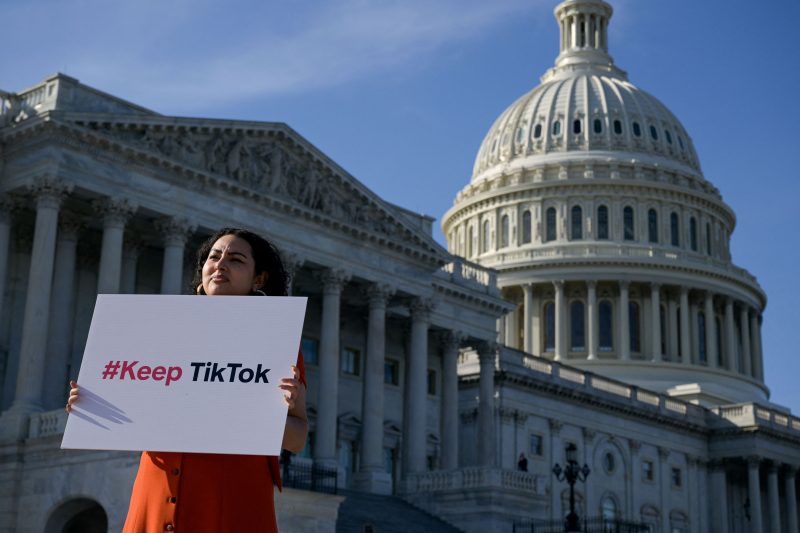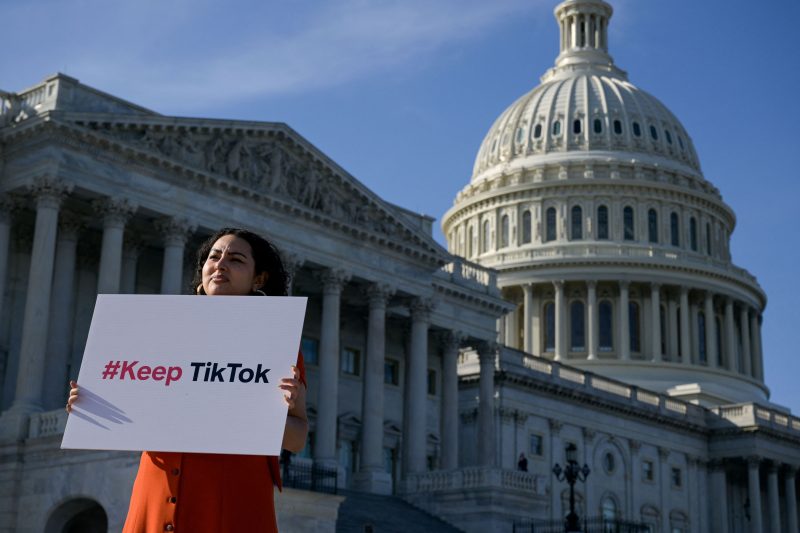
The House’s approval of a bill calling for the forced sale or ban of the video app TikTok in the United States could end up launching a legal battle over the long-running and politically polarizing question: Is such a government effort constitutional?
On Thursday, the only conclusion that seemed certain: The resolution will come in the courts.
The bill’s overwhelming passage marked the first time a chamber of Congress has voted for the forced divestiture of a social media platform. TikTok, which is owned by the China-based tech giant ByteDance, is wildly popular, with 170 million users nationwide.
The legislation’s opponents have said it would violate American users’ First Amendment rights by taking away a platform they use for free expression. They’ve also warned against the government potentially overstepping constitutional boundaries by targeting a single company it dislikes.
“The proper relationship between government and citizen in the United States is that the citizen decides what to be exposed to and what ideologies to embrace,” Rep. Dan Bishop (R-N.C.) said on the House floor Wednesday, speaking against the bill.
“How could it be that Congress should be working hard to devise a means to circumvent that prevailing principle of the First Amendment?” he added. “America confronts a grave challenge in China, and it will not prevail by becoming more like it.”
The bill’s supporters, however, have argued that a forced sale is necessary to address the potential for the Chinese government to use TikTok for data harvesting and propaganda — national-security risks they say should outweigh free-speech concerns. TikTok’s users, they argue, could talk on some other platform if the app went away.
“You wouldn’t allow a radio tower owned by the Chinese to be put up right in the middle of Washington, D.C., and then allow it to just put out Chinese propaganda,” Rep. Dan Crenshaw (R-Tex.) said Wednesday. “The First Amendment does not give the Chinese Communist Party the right to American data or the right to manipulate the minds of Americans.”
The bill would give ByteDance 180 days to sell its U.S. TikTok operation to another interest outside China. After that deadline, the federal government would force Apple, Google and other tech companies to either stop serving up TikTok on their app stores and web-hosting services or face massive fines.
President Biden has said he would sign the legislation if it cleared Congress, but the bill’s fate is uncertain in the Senate, where competing legislation has been introduced. Some senators have backed the House legislation, but Sen. Rand Paul (R-Ky.), who opposed a similar effort last year, could hurt its chances by vowing to block it as “contrary to the Constitution.”
Several senators on Thursday preached caution about moving too quickly against TikTok after the House swiftly passed its legislation in just over a week, including Sens. Laphonza Butler (D-Calif.) and Lindsey Graham (R-S.C.). Sen. Ted Cruz (Texas), the top Republican on the committee likely to review the measure, said the chamber should “examine” the bill and open it up to debate in a legislative markup, but declined to endorse the proposal as it stands.
Potential buyers are already circling. On CNBC’s “Squawk Box” on Thursday, former Treasury secretary Steven Mnuchin said he is putting together a consortium to try to buy the platform. “I think the legislation should pass, and I think it should be sold,” Mnuchin said. “It’s a great business, and I’m going to put together a group to buy TikTok.”
TikTok’s chief executive, Shou Zi Chew, said in a video posted to TikTok and X Wednesday that the company would “do all we can, including exercising our legal rights, to protect this amazing platform that we have built with you.”
Paul and some other Republicans have been joined by civil-liberties groups on the left and right in slamming the bill. Jenna Leventoff, senior policy counsel at the American Civil Liberties Union, urged the Senate in a statement Wednesday to reject the “blatant censorship” bill as “unconstitutional and reckless.” She said the House had “voted to violate the First Amendment rights of more than half of the country.”
Jennifer Huddleston, a technology policy research fellow at the Cato Institute, a libertarian think tank, said in an interview that the First Amendment question will come down to whether the government has “a compelling state interest” and is “using the least-restrictive means when it comes to speech.”
Of the suggestion that TikTok users could simply switch to another platform, she said, “We wouldn’t tolerate it in an offline circumstance — the argument that they can just go to another bookstore, or you can just read another newspaper — if the government were to shut down specific venues for speech in that regard. The same is true for the social media context and TikTok.”
Previous federal measures to restrict TikTok have faced resistance in the courts. After the Trump administration pushed to force a sale or ban of TikTok, two federal judges ruled that the crackdown was based on claims of a national-security threat that was, as Obama appointee Wendy Beetlestone wrote, “phrased in the hypothetical” and would “exceed the bounds of the law.”
While “the ultimate purpose (or intended object) of those prohibitions is to prevent China from accessing those data and spreading disinformation on TikTok,” wrote another judge, Trump appointee Carl Nichols, the government’s actions would lead to “indirect regulations” of personal communications and the exchange of information in an “arbitrary and capricious” way.
Montana’s statewide ban of TikTok was also halted last year by a federal judge, who wrote that it had a “pervasive undertone of anti-Chinese sentiment” and “violates the Constitution in more ways than one.”
The judge, Donald Molloy, also rejected the argument that a ban was acceptable under the law because users could still speak on other platforms, saying that limits on speech should be targeted and precise — a “constitutional scalpel.”
Molloy did not, however, weigh in on a separate legal debate: whether government actions like the House’s TikTok bill would violate the Constitution’s “bill of attainder” clause, which prohibits using legislation to punish a person for an alleged crime without a trial.
Some lawmakers have argued that any bill singling out a particular business would violate that clause. Sen. John Thune (R-S.D.) argued last year against naming TikTok in legislation being considered then, saying, “There is reason to believe that legislation targeted solely at TikTok would be overturned by the courts because of the Constitution’s prohibition on bills of attainder.”
The bill names TikTok but says it would apply to all apps the government decrees are “controlled by foreign adversary companies.” But TikTok and its supporters have pointed to what they say are indications from the bill’s sponsors that the bill was unfairly targeted at them — including, most notably, that the bill document published online last week was titled “TIKTOK.XML.”
Brendan Carr, a Republican on the Federal Communications Commission and vocal TikTok critic, circulated a memo in recent days arguing the bill would not violate the clause because it was instituting future restrictions, not focusing on the past.
And a September report by the nonpartisan Congressional Research Service noted that China’s Huawei Technologies and Russia’s Kaspersky Lab had previously failed in challenging restrictions on their U.S. businesses based on bill of attainder arguments.
The bill’s proponents have tried to distance themselves from a ban, believing a forced sale would be more legally watertight. Biden’s national security adviser, Jake Sullivan, on Tuesday said he wanted “to be clear” that the bill was not about banning TikTok. “The ultimate object of the bill is about a question of ownership,” he said. “Do we want TikTok as a platform to be owned by an American company or owned by China?”
But they could be undermined by recent comments from supporters like Crenshaw, who posted on X last week, “No one is trying to disguise anything. You’re correct — we want to ban TikTok.” (Crenshaw has since said the bill is not a ban.)
TikTok supporters also have argued that a sale within 180 days would be so challenging to maneuver that a ban might be inescapable. China has said it would oppose a forced sale using export-control measures, and TikTok’s estimated price tag, in the tens of billions of dollars, would put it in the realm of only the biggest corporate giants, for whom federal regulators may have antitrust concerns.
The bill’s backers have noted that there is, however, some precedent for restrictions against foreign ownership of broadcast media in the United States. In the Communications Act of 1934, Congress prohibited foreign individuals and companies from being majority owners in U.S. public radio and TV stations, stemming from national security concerns raised during World War I.
The restriction remains in place today, though it does not affect cable TV, and the FCC may grant exceptions. The FCC does not have authority to regulate the likes of TikTok or YouTube, and it is unclear if judges would consider the measure similar enough to count as legal precedent.
The House bill affecting TikTok was drafted with support from senior Biden administration officials, including Deputy Attorney General Lisa Monaco and top officials in national intelligence and defense. Sarah Kreps, director of Cornell University’s Tech Policy Institute, said the co-sponsors and the White House seem “fairly confident” it will be inoculated against constitutional concerns.
But the country’s precedent for national security outweighing free speech, Kreps said, is built on decades-old cases from times of military conflict, such as the 1798 Sedition Act, which criminalized “false, scandalous and malicious writing” about the federal government.
“Once national security is invoked, it gives almost unfettered latitude for the government to sidestep First Amendment concerns, because now this is almost like a wartime footing,” Kreps said. “It is unusual that this would take place outside a wartime circumstance. But the framing of this legislation is invoking that kind of threat.”
The FCC’s bans on foreign ownership of radio and TV stations were first imposed during a time of limited airwaves, not a sprawling global internet. “It does feel in that sense that we’re going back to some kind of Cold War-like media environment,” Kreps said, “where we’re now going to erect boundaries in the service of national security.”
TikTok’s defenders note that the app is used by lawmakers, journalists, political organizers and even Chinese dissidents to share their views and learn information. Since 2020, the number of TikTok users who say they get news on the app has almost doubled, according to the Pew Research Center, with a third of adults under 30 in the United States now using it to follow current events.
But among the bill’s “yes” votes was Rep. Jeff Jackson (D-N.C.), who routinely posts about the unseen realities of Congress to his 2.5 million TikTok followers. In a TikTok post explaining why, he said he didn’t expect the bill would lead to a ban and added, “I think we can solve this problem and keep marching on.”
Reps. Mike Gallagher (R-Wis.) and Raja Krishnamoorthi (D-Ill.), the leaders of the House select committee on China who last week introduced the Protecting Americans from Foreign Adversary Controlled Applications Act, said the bill was not about “shutting down speech” but about targeting the security risks of foreign social media ownership.
“Today we send a clear message that we will not tolerate our adversaries weaponizing our freedoms against us,” Rep. Cathy McMorris Rodgers (R-Wash.), whose committee advanced the TikTok bill, said before the vote.
But the federal government has yet to provide examples of the Chinese government forcing TikTok to share data or skew its recommendation algorithms, further fueling debates over the necessity of such a widespread ban.
“If TikTok truly is breaking laws on a major scale, let us start a legal case with fact-finding and an adversarial process,” the economist Tyler Cowen wrote this week. “Surely such a path would uncover the wrongdoing under consideration.”
Rep. Jim Himes (D-Conn.), the top Democrat on the House intelligence committee, said Wednesday he was clear-eyed about the online threats posed by China but still opposed the “enormously rushed” bill, saying a federal industry-wide privacy law would offer broader protections for Americans in a way that is “consistent with our commitment to freedom of expression.”
“It’s our adversaries that shut down social media platforms, that shut down radio stations, that shut down newspapers,” Himes said in an interview. “We trust Americans to be good stewards of their democracy, and we do not trust the government to decide what platforms Americans have access to.”
The bill’s passage kicked off a victory lap from TikTok critics. Jacob Helberg, a member of the U.S.-China Economic and Security Review Commission, a government advisory agency, posted on X after the vote the names of the representatives who voted against the TikTok bill and said, “Remember them this November. Get in touch with [Alberto E. Martinez] to help fund their opponents.”
Martinez is the executive vice president of public affairs for Targeted Victory, a Republican consulting firm that Meta, which owns Facebook and Instagram, paid to orchestrate a nationwide media and lobbying campaign slamming TikTok as the “real threat” to American teens.
Targeted Victory and Helberg declined to comment. Meta spokesman Andy Stone said, “We don’t know about this project and are not involved.”
Jameel Jaffer, executive director of Columbia University’s Knight First Amendment Institute, said in a statement that the bill was a “betrayal of the First Amendment and a great gift to authoritarians around the world, who will soon be citing this profoundly misguided bill to justify new restrictions on their own citizens’ access to ideas, information and media from abroad.”
But such measures are not new. In 2021, Nigeria’s government banned Twitter across the country, saying it had been used to spread “misinformation and fake news” in a way that “could tear some countries apart.” The State Department chastised the Nigerian government then, saying, “Unduly restricting the ability of Nigerians to report, gather, and disseminate opinions and information has no place in a democracy.”
Jacob Bogage, Ellen Nakashima, Will Oremus and Aaron Schaffer contributed to this report.

